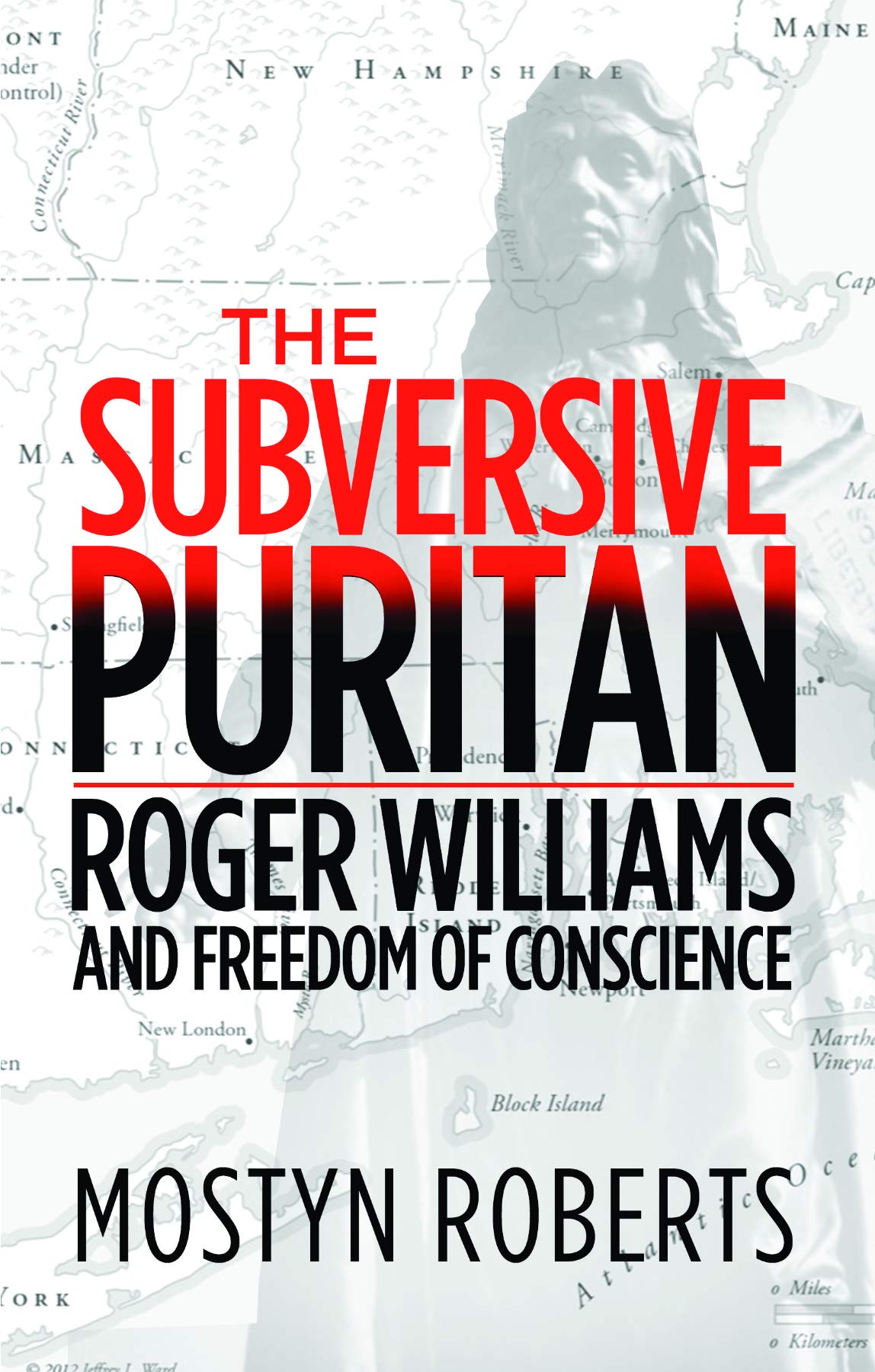An Author Interview from Books At a Glance
Would you like to watch the video interview or listen to the audio? Sign-up today for access to these features and more.
Greetings, and welcome to another Author Interview at Books At a Glance. I’m Fred Zaspel, and today we talk about some very important American church history with Mostyn Roberts about his excellent book, The Subversive Puritan: Roger Williams, Freedom of Conscience, and Church and State.
Mostyn, welcome to Books At a Glance – great to have you with us!
Roberts:
Thank you, Fred. It’s good to be with you.
Zaspel:
Roger Williams is a name we seldom hear of anymore. Who was he, and just briefly, why is he important?
Roberts:
He was born in London in 1603. He lived until he was 80. His death was in 1683. He was a son of a cloth trader. In his teens, he was mentored by a very famous English lawyer called Sir Edward Coke who was lord chief justice and an influential politician. Williams went through school, paid for to some extent by Coke. And then he went to Cambridge where he got his degree. He was ordained and became a chaplain near London. In 1631, with his young wife Mary, he went to New England.
In New England, he was a part of the Puritan establishment. He had to leave New England and went to Rhode Island, founded the state. Williams gave his life to establishing Rhode Island as a place for people who were persecuted for conscience. The reason he had to leave Massachusetts was that he was offending the Puritan establishment. He wanted a place where people had freedom of conscience and separation of church and state. Things which of course 150 years later would be enshrined in the American constitution. He was well ahead of his time and it did not go down well with the Puritan establishment.
Why is he important today? I wrote the book not just as a historical biography but also to try to help Christians today, work out how we can live together with other people who have radically different views on what life is about, where our values are from, what human nature is, and what our values should be. We are now finding ourselves unwelcome guests when we used to be hosts. How do we relate to that? One view is trying to hang on to what we call Christian culture. Through legislation, fighting and politics, and so forth we try to keep hold of our Christian culture. Williams shows us a different way. We can do that to some extent, but we need to be prepared to lower the bar of what we are preparing to live with. Williams was committed to the idea of religious liberty for everybody. He was prepared to live in a society that was not ostensibly Christian.
Zaspel:
Give us a fuller sense of his historical context, the setting, and religious and political background.
Roberts:
The Puritans were great and godly men. I love the Puritans and I adore and absorb their theology. Particularly when they came to New England it was clear how much they were imbued with the Christendom idea. In other words, the church and state should be very closely related. In New England, the setup was a kind of congregationalism, but you can only hold office if you were a church member. It became an established congregationalism. Williams fell foul of them on several issues. Some had to do with church and some with other issues, eventually, they exiled him. His big objection all the time was that the church and state must be separate. It must be separate because the conscience of individuals is going to be trampled upon. The freedom of conscience and the separation of church and state were the two pillars he saw that protect the conscience.
Zaspel:
Can you give us his theology of religious freedom in brief? What were his leading arguments?
Roberts:
He was not alone in his beliefs but was very dogmatic on these issues of freedom of conscience. He argued that God alone is Lord of the conscience. Coercion forms hypocrites. He said coercion does not work because conscience only happens when people really think and believe things. What eventually suffers when the conscience is not respected is that the true church will come under persecution. We are suffering from an atheistic state today. He says, “that religion cannot be true which needs such instruments of violence to uphold it.” If you have true religion, why do you need persecution to uphold it? He had great confidence in letting God do the work. It did not need to be propped up by the arm of the state.
He was very critical about how he felt his Puritan brothers who in England had come under persecution from Kings James I and Charles I. When they got to New England, they persecuted other men and women who were trying to find religious freedom themselves. The Bible is true and if you reject the teachings of Scripture, you must be going against your conscience because your conscience must see the truth. The Puritan experiment could not last very long because you cannot run a state like a church.
Zaspel:
Was there evident progress or development in Williams’ thinking – in this or other areas of theology? And if so, who would have influenced him?
Roberts:
Beginning his conversion, around the age of 10. He talks in a very Puritan way about the Lord revealing himself to him. From the evidence, he came to Puritan convictions in Cambridge. In his later years in Cambridge, he came to separatist convictions as well. He left Cambridge before he got his MA. He got his BA but then he did not get his MA. In discussions with eminent Puritans at that time, he was talking in terms of not worshipping according to the prayer book or mixing with people in the established church. These were radical separatist views. Most Puritans were working within the established church to try to purify it.
When he went to New England, he was offered the ministry of the Boston church. It was a big job and quite a prominent job for a man who was regarded highly by his fellow brothers. He said he would not do it because there were people there who were not separated enough from the church of England. They were receiving people who would have fellowship within the church of England. He then went to Salem then Plymouth and began developing views that the state should not demand an oath, it was an act of worship from somebody who does not necessarily believe in God.
In the 1630s he was in his early 30s, he began working through these things. In 1644 he wrote his classic, The Bloudy Tenent of Persecution. After that, there is not a lot of evidence of development in his thinking. He was a Calvinist. His ecclesiology and eschatology were very odd. I think he was influenced by Arminian Baptists. He was being influenced by separatists and anabaptists.
Zaspel:
Talk to us about the response to Williams. And give us a sense of what his convictions cost him personally.
Roberts:
The response to him is very interesting. In Puritan England, the few years in between leaving Cambridge and coming to America he had a conference with important names in the Puritan world. He seems to have been well thought of. It was his separatist ideas and obsessive view of liberty of conscience that began to turn people against him. He was about to be deported and got wind of this. He escaped and 14 weeks later he washed up in New England and founded Providence. After this, they would not let him travel through and go to England or publish his books. He did retain a very friendly relationship with John Winthrop.
When he came back to Old England in 1643, he wrote a book called A Key to the Language of America. It was quite a brilliant analysis of the language of the Indians he was living with. It was a guidebook to their language. He published this in London, and it had great approval. It showed he was someone who was trying to reach the Indians. This opened a door for him, and he was well received. In later life, he was regarded as the eccentric who was found in Rhode Island.
Zaspel:
Were there any significant American voices of support?
Roberts:
He had some Baptist friends and was warmly regarded by some men in the Plymouth colony. He had friends like John Clarke who helped him get the charter from King Charles the II in 1663. There were not many at the time but when you look at what happened in Connecticut and New Hampshire then it is clear that he was influencing some people. People were seeing that a state can exist without a religious settlement being imposed.
Zaspel:
Tell us about Williams’ ministry to the American Indians and how that came about.
Roberts:
I deal with it in the appendix. He wrote to John Winthrop and said he wanted to reach the Indians. He got to know them and worked with them. It is clear from his book A Key to the Language of America. He was able to explain their religion. He was not unrealistic about their faults. They had mutual respect for each other. He was grateful to them because they helped him when he was exiled from Rhode Island. He had great linguistic abilities to reduce their language to print. He was beginning to show his theological views were hindering his evangelism. He developed a strange belief that since the apostles, the church had lost its authority to found churches and preach for conversion. Because of his understanding of the book of Revelation he took his beliefs about eschatology to extremes. He wanted the Indians to really know God. He had a degree of skepticism about large-scale Indian conversions.
Zaspel:
Looking back after the fact, what was his impact and legacy?
Roberts:
At the time, his impact was not great apart from founding a state of the union. Rhode Island was the first with the liberty of conscience in its laws. When you come into it 100 years later there were Baptists who picked up his stuff and who realized he could help in their cause on independence and freedom of conscience. Williams made it very clear that when you break down the wall of separation, the church suffers.
Zaspel:
How did a Brit come to take such interest in an American figure?
Roberts:
I started reading on the liberty of conscience in 2012 and was taken by him. I was a lawyer before I came into the ministry and always had an interest between interaction on theology and politics, church and state matters. I get more and more intrigued about his convictions. He suffered for his beliefs and was prepared to be exiled. He had incredibly difficult people to deal with in Rhode Island. I found him fascinating. He shows how we can live together on a tolerable basis. We cannot assume a Christian culture, but we have to do the work of God.
Zaspel:
We are talking to Mostyn Roberts about his fascinating book, The Subversive Puritan: Roger Williams, Freedom of Conscience, and Church and State. It is wonderful reading about a man whose influence helped to shape America as we have known it.
Mostyn, thanks so much for talking to us today.
Roberts:
Thank you!
Buy the books

THE SUBVERSIVE PURITAN: ROGER WILLIAMS, FREEDOM OF CONSCIENCE, AND CHURCH AND STATE, by Mostyn Roberts
